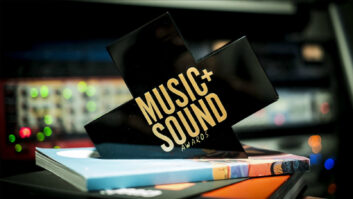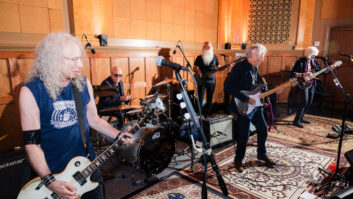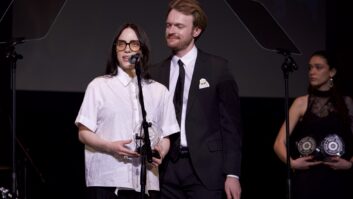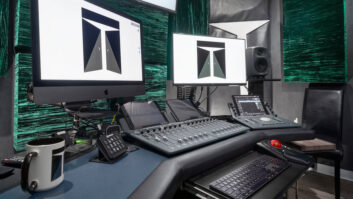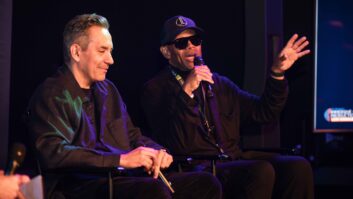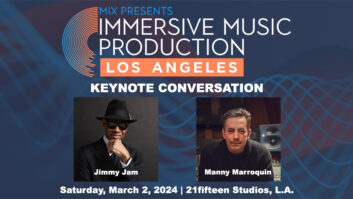
Currently to be seen at a number of showcase screenings around the county, Score: A Film Music Documentary from writer/director Matt Schrader follows the progress of modern-day film-score development, and illustrates how the first few notes on a piano keyboard can transition into dramatic moments within a motion picture’s emotional climax. By throwing a spotlight on the creative challenges faced during the recording of a contemporary film score, Schrader’s carefully researched documentary highlights the way in which composers shape their musical creations within scoring stages around the world; it is must viewing for sound professionals.
Offering a fascinating look at the art of film scores and their realization, Score profiles the innovative work of Danny Elfman, Elmer Bernstein, Hans Zimmer, John Debney, John Williams, Brian Tyler, Quincy Jones, Randy Newman, Howard Shore, Trent Reznor and many other leading composers. Partially crowdfunded through Kickstarter, the documentary demonstrates that, while often remaining invisible to audiences, a carefully crafted musical score plays an integral part in most films, adding emotion and empathy.
There are a number of standout moments, including the music of Max Steiner, whose music enhanced King Kong (1933); Alex North’s intricate score for A Streetcar Named Desire (1951) legitimized the use of jazz; and John Barry’s seminal guitar themes for the early James Bond outings. And who can forget Bill Conti’s rousing theme to Rocky (1976) that worked so well against the workout montage? Or Bernard Herrmann’s tense strings during the murder scene in Psycho (1969) and which, remarkably, director Alfred Hitchcock initially did not want to use at all. Work by more recent innovators, including Trent Reznor – The Social Network (2010) – and Danny Elfman – Fifty Shades of Grey (2015) – are featured, with the latter opting to use unusual percussion. “There is only one rule,” Elfman states. “There are no rules.” And as Hans Zimmer offers, film composers are “one of the last people on earth” that regularly employ orchestral musicians. “Without us,” he offers, “the orchestra might disappear.” Indeed.
The 94-minute film includes various segments that feature sessions at such facilities as Air Lyndhust in London, where we see composer David Arnold working on the score for Casino Royale (2006), and at Abbey Road’s Studio 1 for composer Joe Kraemer’s score to Mission Impossible: Rouge Nation (2015), which involved recording some 110 minutes of music. Abbey Road also was used to record John Williams’ scores for Return of the Jedi (1993) and Star Wars prequels with the London Symphony Orchestra, plus remixing Howard Shore’s scores for all three Lord of The Rings films.
The film’s narration explains that US-based facilities, including Fox Scoring in West Los Angeles and Warner Bros’ Eastwood Stage in Burbank, are known for their stronger and possibly more “aggressive sound” compared to UK and European facilities. “I love working with a live orchestra,” concedes composer John Debney. “That’s what I live for;” working on a film score “is like seeing your child born.” Hans Zimmer is described as being known for his “rock-and-roll swagger; after composing the score for director Ridley Scott’s Gladiator (2000), he gained a reputation for “taking strings and making them into a rhythm section.” His various scores for the Pirates of The Caribbean franchise are described in the film as “sounding like Led Zeppelin [but] played by an orchestra;” his score for Inception is said to “wash over the audience in waves.”
My favorite moment occurs during the end credits, when director James Cameron recalls working with the late composer James Horner on the score for Titanic (1997). I won’t spoil the punch line, but the confusion that resulted from Horner labeling his cue as “The Sketch” – implying that it was destined for a section of the film during which Jack Dawson (played by Leonardo DiCaprio) is sketching the naked Rose DeWitt (Kate Winslet) – is particularly poignant, given the music’s eventual use.
Guest Blogger Mel Lambert is the head of content-creators.com.
